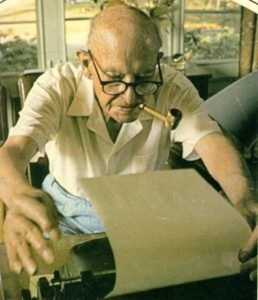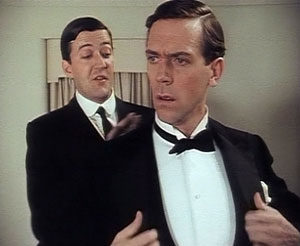 Ivy Compton-Burnett admitted in old age that she could no longer read the novels of Jane Austen, which she loved, because she knew them so well that they could no longer hold her attention. Much the same thing happened to me with Sir Arthur Conan Doyle’s Sherlock Holmes stories: I read them so often as a boy that I lost the ability to enjoy them in adulthood. Even so, the Holmes stories are still very much a part of the common stock of literary reference on which I draw in writing and conversation. Hence it was a source of great vexation in recent months that I found it impossible to trace to its original source a remark by Holmes that I remembered—or, as it turned out, misremembered—as follows: “I shall watch your future career with great interest.”
Ivy Compton-Burnett admitted in old age that she could no longer read the novels of Jane Austen, which she loved, because she knew them so well that they could no longer hold her attention. Much the same thing happened to me with Sir Arthur Conan Doyle’s Sherlock Holmes stories: I read them so often as a boy that I lost the ability to enjoy them in adulthood. Even so, the Holmes stories are still very much a part of the common stock of literary reference on which I draw in writing and conversation. Hence it was a source of great vexation in recent months that I found it impossible to trace to its original source a remark by Holmes that I remembered—or, as it turned out, misremembered—as follows: “I shall watch your future career with great interest.”
I was certain beyond the slightest possibility of doubt that Holmes had said something like that, for I was no less certain that it was also a favorite phrase of Bertie Wooster, whose conversation is studded with quotations from the books and stories that P.G. Wodehouse read as a boy, among which the published cases of Sherlock Holmes figure prominently. But I couldn’t trace the remark to anything that Conan Doyle or Wodehouse had written, try though I might, and the more I tried to find it via Google, the more frustrated I became.
 Over the weekend it finally occurred to me to do what I should have done long ago, which was to ask Mrs. T, who is, like me, an ardent Wodehouse fan of long standing. No sooner did I ask her than her face lit up brightly with the realization that she knew something I didn’t. “I think you’ve got it wrong,” she said with uncontained glee. “It’s not great, it’s considerable.” And sure enough, it was: a quick search on Google told me that Bertie says “I shall watch your future progress with considerable interest” in Joy in the Morning and The Mating Season, in addition to which the same sentence is said to Bertie by another character in one of the stories collected in Very Good, Jeeves!
Over the weekend it finally occurred to me to do what I should have done long ago, which was to ask Mrs. T, who is, like me, an ardent Wodehouse fan of long standing. No sooner did I ask her than her face lit up brightly with the realization that she knew something I didn’t. “I think you’ve got it wrong,” she said with uncontained glee. “It’s not great, it’s considerable.” And sure enough, it was: a quick search on Google told me that Bertie says “I shall watch your future progress with considerable interest” in Joy in the Morning and The Mating Season, in addition to which the same sentence is said to Bertie by another character in one of the stories collected in Very Good, Jeeves!
The problem, as I should have realized all along, is that Bertie was a notorious quotation-bungler, making it unlikely in the extreme that he would have cited Holmes exactly. So I took to Twitter and asked for help, and within a few minutes two of my followers had pointed me to two stories by Conan Doyle that, between them, are clearly the source of the “quotation.”
The first story is “The Adventure of the Three Students,” collected in 1905 in The Return of Sherlock Holmes, which ends as follows:
Well, Soames, I think we have cleared your little problem up, and our breakfast awaits us at home. Come, Watson! As to you, sir, I trust that a bright future awaits you in Rhodesia. For once you have fallen low. Let us see, in the future, how high you can rise.
The second story is “The Disappearance of Lady Frances Carfax,” collected in 1917 in His Last Bow: Some Reminiscences of Sherlock Holmes, in which Holmes signs off with this capper: “If our ex-missionary friends escape the clutches of Lestrade, I shall expect to hear of some brilliant incidents in their future career.”
 It’s easy enough in retrospect to see how Bertie, whom even the ever-faithful Jeeves unhesitatingly described as “mentally negligible,” might well have managed to conflate these two quotations. His mind—such as it was—worked that way. Had I continued searching on my own, though, I very much doubt that I would ever have managed to track them down to their primary sources. Such being the case, I humbly thank Mrs. T, David Hines, and David Mackinder for pointing me in all the right directions.
It’s easy enough in retrospect to see how Bertie, whom even the ever-faithful Jeeves unhesitatingly described as “mentally negligible,” might well have managed to conflate these two quotations. His mind—such as it was—worked that way. Had I continued searching on my own, though, I very much doubt that I would ever have managed to track them down to their primary sources. Such being the case, I humbly thank Mrs. T, David Hines, and David Mackinder for pointing me in all the right directions.
I feel much better now, thanks.
